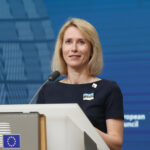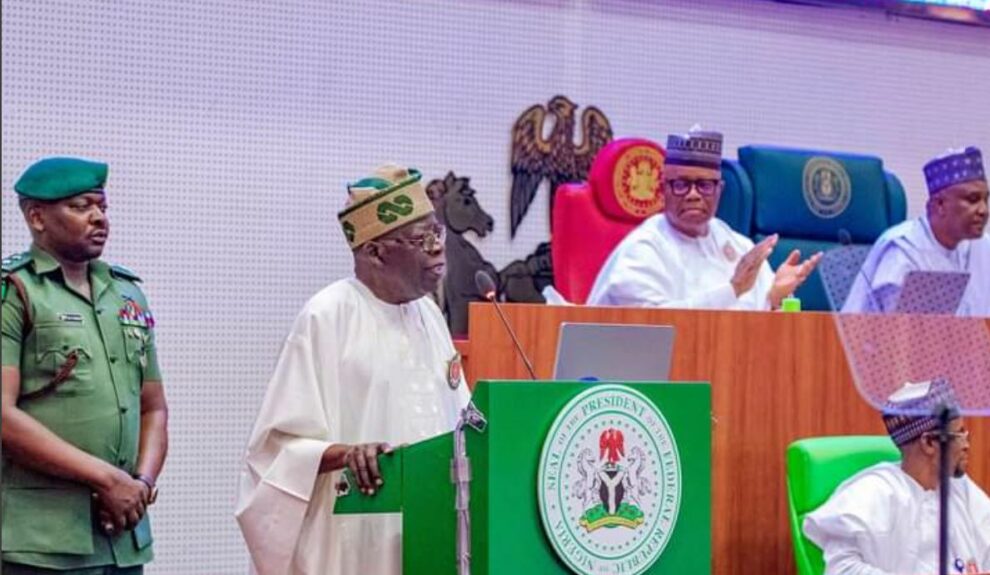President of Nigeria’s Senate, Senator Godswill Akpabio, and Speaker, House of Representatives, Tajudeen Abass, assured Tinubu that the 2024 Appropriation Bill would be accorded accelerated consideration and passage.
The two presiding officers of the federal legislature gave the assurance when Tinubu laid the 2024 national budget before a joint session of the National Assembly, which also had in attendance top government functionaries and politicians.
Akpabio and Abass urged the president to bar ministers and heads of federal government MDAs from embarking on foreign trips until the eventual passage of the bill, which they pledged would be done before the end of the year.
The duo expressed the hope that the executive arm would maximise the opportunity of the cordial relationship between it and the legislature by ensuring prompt appearances before the various legislative committees to defend their budgets whenever they were invited to do so.
Akpabio, specifically, said though the fiscal document would be attended to with dispatch, the National Assembly would still carry out its constitutional responsibilities on it.
He said, “The National Assembly bears a great responsibility in the task of reviewing and approving the budget. We fully understand the weight of this responsibility, and the impact our decisions will have on the lives and welfare of the Nigerian people.
“It is our duty to ensure that the budget reflects the principles of transparency, accountability and inclusiveness. Consequently, we will certainly conduct a thorough and meticulous review of the budget estimates.”
Akpabio expressed the determination of the two chambers to stem wastage and corruption in the system, hence its resolve to carry out legislative activities that would lead to the merger of some federal agencies and the unbundling of others.
He said, “Both the Senate and the House of Representatives have resolved to assist the executive to unbundle some agencies for effectiveness, and merge agencies of government, which job definitions or roles overlap, for greater effectiveness.
“We deem it necessary for our country to go back to agriculture as a way of stopping the overdependence on crude oil.
“A mono-economy is putting all our eggs in one basket. It is a risk we have taken for too long and we cannot continue to tempt providence.
“We also believe that education should be prioritised and something done to stop frequent closures.
“If we do not checkmate the brain drain, the drain will numb our brains. This is why we must open the door of education, because when you open the door of education you close the door of the prison.
“We also want to plead with the government to do all within its powers to reduce our high debt profile. We know that Mr. President inherited this worrisome burden. But then, the mark of a great leader is that he fixes the problems wherever they exist.”
On his part, Abass acknowledged the pains, agony and sufferings most Nigerians were currently experiencing as a result of the ongoing economic reforms embarked upon by the current administration and urged the president to lessen the misery.
Abass said, “Mr. President, it is a well-known fact that millions of our constituents are living through incredibly difficult times.
“For this reason, they also look to the Tinubu-led government to provide quick and sustainable solutions.
“The antecedents of the president and your track record in governance inspire a lot of hope in Nigerians. Mr. President, it is for this reason that we cannot afford to fail Nigerians.
“If anyone can change the rot and chart a new course for Nigeria, it is you. I have no doubt whatsoever that we can measure up to the expectations of Nigerians through your visionary leadership and the commitment of the National Assembly.”
The speaker urged his colleagues to ensure that the 2024 budget prioritised investment in education and healthcare, which he said was critical to human capital development and a more productive workforce.
He added, “Infrastructure development is another critical area of importance, which is crucial for economic growth. The biggest challenge, however, is balancing these priorities within the constraints of available resources.
“In view of this and the related challenge of a high level of public debt, the National Assembly will ensure that the 2024 budget includes concrete strategies for sustainable debt management.”
He said that would include measures to increase revenue and control expenditure.
Abass said, “Specifically, the focus should be on raising more revenue through tax reform, fiscal reform, subsidy reform, foreign exchange convergence, and centralised revenue collection.
“Going forward, Mr. President, we will also work to institutionalise pre-budget engagements with the executive to further improve and hasten the budget process.
“The House has already commenced interface with MDAs through the sectoral debates to understand the challenges facing government agencies and identify areas for legislative intervention.
“All of these efforts are geared towards ensuring that we provide the necessary legislative support to your administration’s Renewed Hope Agenda.”
Abass noted that an institutional framework was necessary to achieve a prefect budgetary system in the country.
He said, “For this reason, I propose enacting a Budget Act to strengthen the budget process and promote development outcomes.
“This is a well-established practice in democracies across the world.”
PDP: Tinubu’s 2024 Budget Proposal, Deceitful, Strangulating, Hopeless
PDP on Wednesday described the budget proposed by Tinubu for 2024 as a huge disservice that, if allowed to pass, would further suffocate Nigerians and plunge the country into more economic misery and bleakness.
PDP also dismissed the claim by Tinubu that the budget was a “Budget of Renewed Hope”, describing it as “conjured, unfounded and deceptive, as the budget is completely devoid of concrete mechanisms to revive the economy, create jobs, address the comatose manufacturing and productive sectors, human capital development deficiencies and depleting life expectancy of Nigeria citizens.”
A statement by National Publicity Secretary of PDP, Hon. Debo Ologunagba, said, “The 2024 budget is filled with heavily padded figures, duplicated items and several false statistics, including claims of global increase in inflation rate, as excuse for an impending excruciating increase in taxes and interest rate to the detriment of our productive sector.
“It is clear that the 2024 budget as proposed with its heavy provisions for luxury appetite of the Presidency and All Progressives Congress (APC) leaders, which is predicted and expected to be funded from multilateral and bilateral foreign loans and increased taxes on Nigerians, is designed to further mortgage our nation and strangulate the already impoverished Nigerians.”
The statement noted that the budget framework with respect to recurrent expenditure vote of N9.9 trillion, capital expenditure vote of N8.7 trillion, and N8.25 trillion for debt service was unsustainable and unrealisable in view of the stated outstanding debt and proposed borrowing, which was allegedly targeted mainly to finance consumption, luxury appetite, and debt service.
According to the PDP spokesperson, “The lack of concrete and verifiable action plans to revive the manufacturing, energy, agricultural and education sectors, which are the main drivers of any economy, is a pointer that the Tinubu-led APC government is bereft of ideas and completely disconnected from the reality of life being faced by Nigerians.
“It is of grave concern that the president in the budget speech stated that his government has ‘adopted a naira to US Dollar exchange rate of N750 per US Dollar for 2024’”.
PDP further stated that the budget estimates were “a clear admission of failure, incapacity and lack of direction by the APC administration to manage and grow the economy in such a way as to strengthen the national currency, productivity and competitiveness in the global market”.
Ologunagba explained that the budget further confirmed that the numerous promises by the president and officials of his government “have been a deceptive ploy, which is consistent with the APC in the past eight and half years”.
He stated, “By adopting a defeatist N750 per US Dollar exchange rate, President Tinubu has further plunged our economy into the abyss, weakened our productive sector, wrecked the purchasing power of Nigerians and the capacity of the youths to be creative, recognising that it will be almost impossible for small and medium enterprises as well as start-ups to access capital under such a suffocating budget.
“Every responsible leadership strives to work and defend its national currency. Unfortunately, the Tinubu-led government has surrendered our nation currency and pride to the whims and caprices of the so-called ‘market forces.’”
PDP insisted that with transparent, honest and innovative management of resources and economic potential of the country, “without inordinate pursuit of luxury consumption by a few individuals in leadership position, as being witnessed under the APC, the economy will witness a rapid turn-around and the Naira strengthened to its value of below N200 per US Dollar bequeathed by the PDP to the APC in 2015”.
According to Olohunagba, “This 2024 budget, as presented by President Tinubu, therefore, represents hopelessness for Nigerians. It is pathetic that the president, whose main duty is to provide for the security and welfare of Nigerians, as provided for in Section 14 (2) (b) of the Constitution of the Federal Republic of Nigeria, 1999 (as amended), could present a budget that is not geared towards the attainment of that constitutional duty imposed on him.”
PDP called on the National Assembly, “pursuant to its constitutional duty under Section 80, 81 and 82 of the 1999 Constitution, to reject the 2024 budget as presented and use its legislative powers to disassemble the budget and make provisions that are critical and pivotal to the growth of the economy and the welfare of Nigerians”.
Source: Arise















